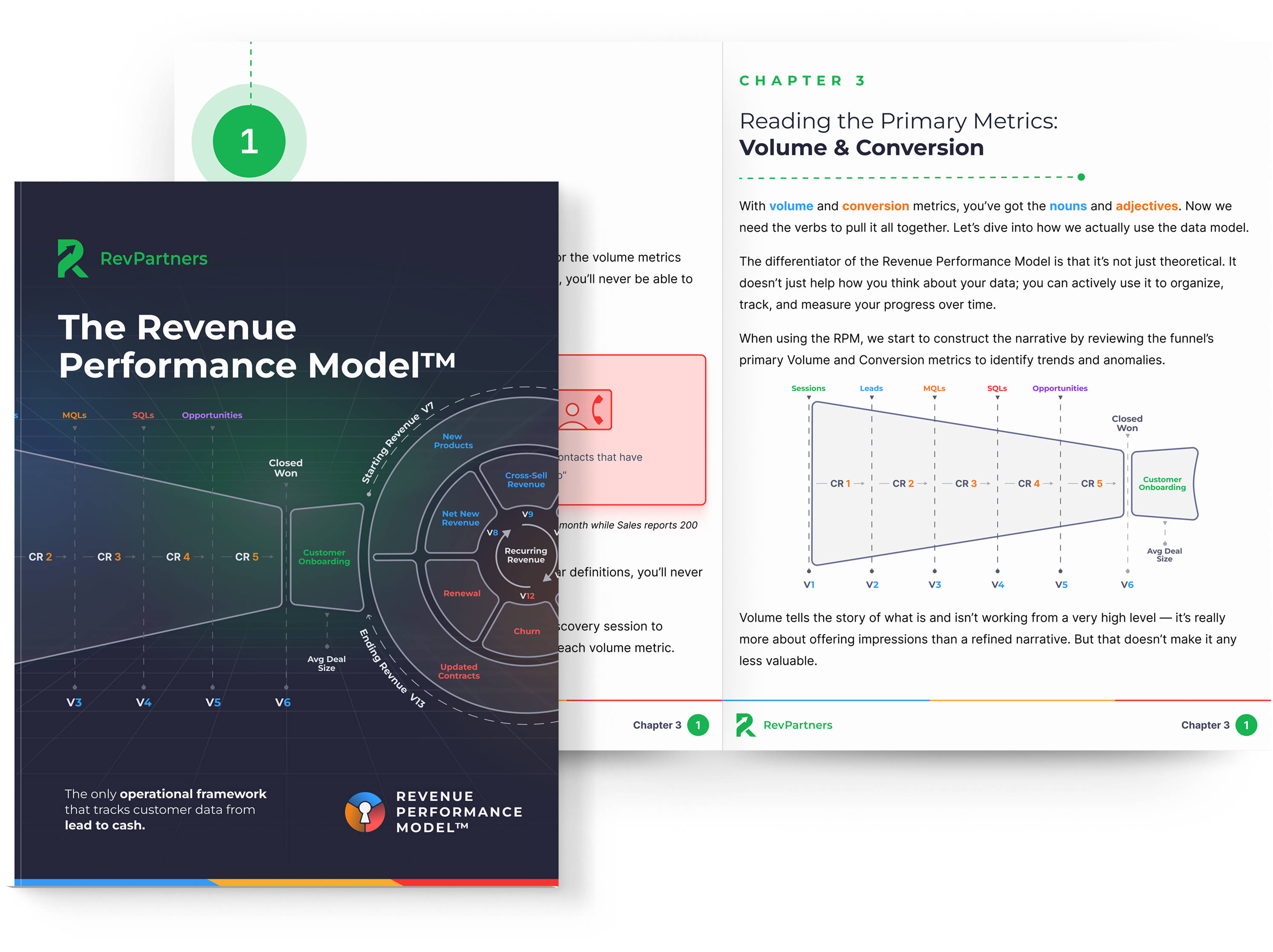Table of Contents
What Is RevOps?
Some tasks are very challenging: splitting an atom and climbing Mount Everest are good examples. A third addition to this list could be describing what Revenue Operations (“RevOps”) is to someone outside of the field. For many RevOps professionals, answering the inevitable 'so what do you do for a living?' can feel impossible without a clear revenue operations definition that resonates.
Watch the full video series: RevOps Summer School - with Matt Bolian
Why is this? Quite simply, it is because there is not a universally accepted and adopted definition of RevOps. Want proof?
Try this fun exercise: Type “RevOps'' into Google and continue clicking each search hit until you find a repeated definition. Warning: you might want to pop a bag or two of popcorn for this one as it will take literally forever.
You’re going to see lots of “sales, marketing, and customer success”, “silos are bad”, “it will help your teams work together”, “it’s a business function”, “getting marketing operations and sales ops on the same page”, and other jargony statements, just never in the same order and often worded in an increasingly intricate manner.
Although many of these definitions touch on common pain points in the trade, and therefore have a tendency to make a positive connection in one way or another with many RevOps professionals, they are simply not accurate.
TL;DR: What Is RevOps?
-
Most definitions describe outcomes, not the actual function of RevOps
-
RevOps is the science of sustainable revenue growth across the entire customer journey
-
It's not just alignment...it’s systems, processes, and data working together to drive compounding growth
-
Without a shared definition, teams chase goals without clarity or consistency
-
Done right, RevOps delivers real results: faster growth, better retention, and smarter decisions
Why Most RevOps Definitions Miss the Mark: RevOps Best Practices in Focus
The problem with nearly every one of these “definitions” is that they are describing a desired outcome; they are explaining what revenue operations done well looks like. The actual meaning of the term is never fully fleshed out in these interpretations of the word.
As an example of how these proposed definitions fall short, consider what a good response would be to the question, “what is hockey?” The correct response is not “scoring goals.” Scoring goals is the ultimate objective; scoring goals is what hockey done well looks like.
“Scoring goals” does not explain, in any way, what hockey actually is to someone completely unfamiliar with the sport. In a similar fashion, proclaiming RevOps as 'the unifying of your internal operations' reduces it to a vague RevOps function rather than a defined discipline.
Clearly, a good RevOps meaning is hard to come by.
Not sure what RevOps actually looks like in practice? The Bowtie Model breaks it down with clear stages, metrics, and revenue levers. 👇
Why a Unified RevOps Meaning Matters for Your Business: RevOps Best Practices Matter
Due to the lack of a common definition, the following problems have emerged:
- Widespread definitions of RevOps that are far too theoretical in nature
- Without a single source of truth, there is no way to effectively connect strategy and models with tactics, which can negatively impact the customer experience.
- Can’t prioritize what’s important and not important
- Without a common language, it is difficult to communicate value or enable data-driven decision making across teams. That gap doesn’t just cause confusion, it costs money. Businesses that adopt RevOps see a 30% reduction in GTM expenses and up to 30% improvements in operational efficiency, thanks to tighter alignment and smarter resource allocation.
- It is very hard to upskill as a RevOps pro
HubSpot Onboarding
We set up your CRM with RevOps in mind—aligning marketing, sales, and customer success from the start so everyone’s working from the same system and strategy. 👇
HubSpot Technical Consulting
When things get more complex, we go deeper. Whether it’s custom architecture, workflow design, or advanced reporting, we tailor your tech stack to support scalable, efficient revenue operations. 👇
It doesn’t have to be this way.
What Is RevOps? It’s Not as New as You Think – A Look at RevOps Best Practices
RevOps has always been utilized, but just recently the term itself blew up. Before it became a hashtag on LinkedIn, companies were driving revenue growth and pursuing continuous improvement through RevOps principles by integrating marketing, sales, and customer teams more effectively. The industry created the term, the term didn’t create the industry.
The problem is that many people think revenue operations is a new thing, and, as a result, there has been a rush to define it. But companies have been doing it (whether they call it that or not), and when done well, it pays off, RevOps-aligned organizations grow revenue 3x faster than those without it.
Let’s make an attempt at defining what revenue operations really is. Sometimes, the best way to define a word is to define what it is not.
RevOps is NOT:
- New
- Alignment
- A methodology
- A mindset or “way of thinking”
- Something a person/company can start or stop (you’re doing it…the only question is whether you’re doing it well or poorly)
The Real RevOps Definition: Science of Sustainable Growth and RevOps Best Practices
Very simply, RevOps is the science of sustainable revenue growth.
HubSpot Integrations
We connect HubSpot to the rest of your tech stack—creating a unified, real-time view of your revenue data across marketing, sales, and CS. 👇
HubSpot Migrations
If you’re moving into HubSpot, we make it painless. We clean, map, and migrate your data into a RevOps-ready setup that sets you up for long-term success. 👇
It seeks to accomplish the following:
Replicate and repeat revenue growth
Uncover the process of how revenue teams, including customer success teams, can teach, measure, repeat, improve, explain, and apply RevOps strategies to the full revenue cycle. And when teams are aligned under a RevOps framework, the impact is massive: customer retention jumps by 24% and customer satisfaction rises by 18%.
Identify tech stack and behaviors that show how you’re collecting, synthesizing, and disseminating revenue data
The above revenue operations definition works because it:
- Is rooted in science, not jargon
- Treats RevOps as something that can be studied, repeated, and properly leveraged
- Can take RevOps from theory to action
- Does not merely describe an end objective
This is how you define RevOps.
Why Revenue Operations Matters: Real-World RevOps Best Practices Impact
Revenue Operations Definition: How RevOps Took Over GTM
RevOps. Almost no one used this word 5 years ago, but now it has page one status on nearly every company’s manifesto. Why and how has it become so popular? Although organizations have been doing revenue operations for countless numbers of years, the term itself, “revenue operations”, sounds like something your grandfather did while wearing a business suit and shiny shoes.
No one really cared about “revenue operations.” “RevOps”, on the other hand, sounds cool. It sounds fresh. It sounds like something you can do in fashionably ripped skinny jeans and a graphic tee while wearing custom earbuds.
RevOps Brings the Receipts: Proof of RevOps Best Practices
Beyond that, though, it is the promise of RevOps that explains how it came to prominence.
Studies have shown that it produces the following with regards to driving revenue:
- 15% increase in profitability
- 15% increase in sales productivity
- 19% increase in speed of growth
- 71% increase in stock performance
- 100% increase in digital marketing ROI
These types of numbers, and the promise of potentially higher ones, highlight how RevOps helps organizations drive long-term revenue growth effectively.
But if you want to hit those numbers, you need to do RevOps well.
Implementing RevOps correctly requires aligning your revenue operations teams with sales, service, and marketing to enhance the customer journey and make more informed decisions.
By focusing on sales enablement, improving customer satisfaction, and reducing churn, RevOps helps sales and customer success teams close deals faster and strengthens retention. This holistic approach ensures the entire revenue and market teams are synchronized in their efforts to drive revenue, increase customer lifetime value, and sustain growth.
The Revenue Performance Model
Do you want to track the entire revenue journey in your CRM so you can see what's broken, why it happened, and where to fix it?
Download the Revenue Performance Model HERE
.png)












.png)

